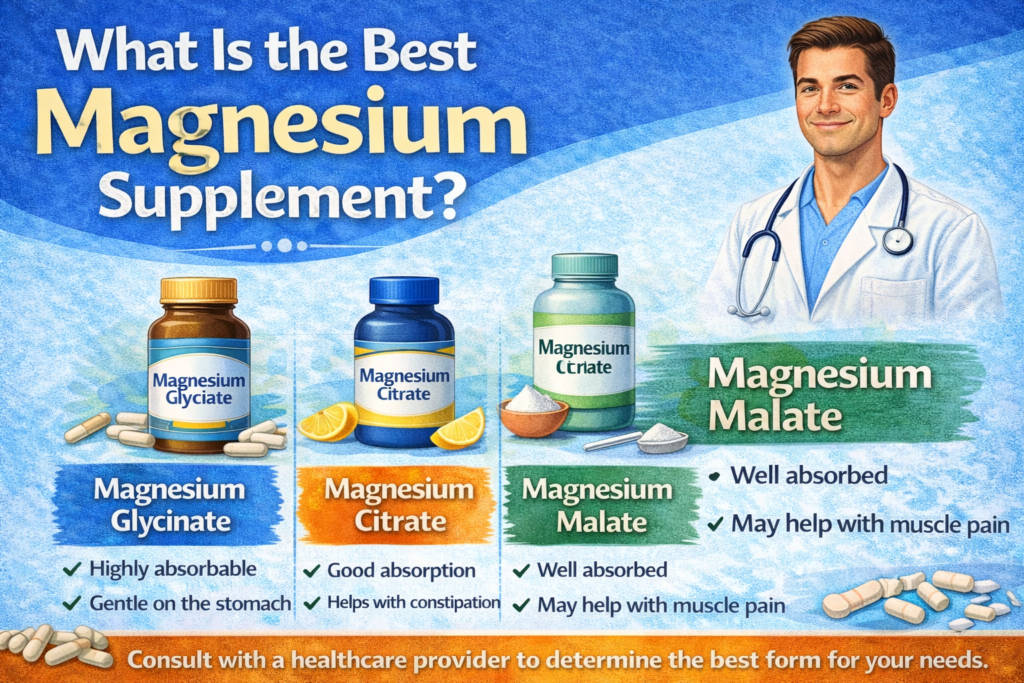High cholesterol is one of the most common health issues affecting people worldwide. It increases the risk of heart disease, stroke, and other cardiovascular issues. Many individuals look for natural supplements to support cholesterol management — and one supplement rising in popularity is magnesium glycinate. But the big question is: Can magnesium glycinate really help lower cholesterol?
This Health Blog post by Top Health Coach will break down the research, benefits, risks, and best ways to use magnesium glycinate effectively and safely.
🌿 What Is Magnesium Glycinate?
magnesium glycinate is a compound made of magnesium and the amino acid glycine.
It is one of the most highly absorbable and gentle forms of magnesium, commonly used to:
- Improve sleep quality
- Reduce anxiety and stress
- Support healthy nerve and muscle function
- Reduce muscle cramps
- Improve mood balance
Because of its calming effect on the nervous system, magnesium glycinate is often recommended for individuals experiencing stress-related health issues. However, new studies suggest it may also support better heart health and cholesterol regulation.
❤️ How Cholesterol Works in the Body
Before understanding how magnesium glycinate helps, we must understand cholesterol.
There are two main types:
| Cholesterol Type | Meaning | Effect |
|---|---|---|
| LDL (Low-Density Lipoprotein) | “Bad” Cholesterol | Can build plaque in arteries |
| HDL (High-Density Lipoprotein) | “Good” Cholesterol | Helps clear LDL from the bloodstream |
High LDL + Low HDL = Higher Risk of Heart Disease
The goal is lower LDL and increase HDL while managing inflammation.
🧠 How magnesium glycinate May Help With Cholesterol
Research shows that magnesium plays a role in more than 300 biochemical reactions in the body, including lipid metabolism and blood sugar regulation.
✅ 1. Improves Cellular Repair & Reduces Inflammation
Chronic inflammation is one of the root causes of high cholesterol.
Studies show magnesium glycinate may reduce C-reactive protein (CRP), an inflammation marker.
✅ 2. Helps Regulate Blood Pressure
High cholesterol and high blood pressure often occur together.
Adequate magnesium relaxes blood vessels → improves circulation → reduces strain on the heart.
✅ 3. Supports Better Insulin Sensitivity
Poor sugar metabolism can raise cholesterol levels.
magnesium glycinate may help stabilize blood sugar levels, lowering cholesterol risk.
✅ 4. Boosts Good Cholesterol (HDL)
A 2022 clinical review showed magnesium supplementation helped increase HDL levels in some individuals over time.
📌 Important Note:
magnesium glycinate does not act like a cholesterol-lowering medication.
It is supportive, not a replacement for prescription therapy when needed.
📝 Scientific Fact Check
| Study | Result | Conclusion |
|---|---|---|
| Journal of the American Heart Association (2018) | People with higher magnesium intake had lower LDL | Magnesium supports healthy cholesterol metabolism |
| Nutrients Journal (2021) | Magnesium supplementation improved HDL levels | Helps improve lipid profile gradually |
| Harvard Health Research Review | Low magnesium linked to increased heart disease risk | Adequate magnesium is essential for heart health |
So there is evidence, but results vary among individuals — consistency matters.
🍽️ How to Use magnesium glycinate Safely
| Item | Recommendation |
|---|---|
| Typical Supplement Dose | 200–400 mg per day |
| Best Time | Evening or before bed |
| Form | Capsule or powder |
| With Food or Empty Stomach? | Can be taken with food to avoid stomach discomfort |
Who should avoid taking it without medical guidance:
- People with kidney disease
- People on heart rhythm medications
- Pregnant or breastfeeding women (speak with a doctor first)
Always consult a healthcare provider before starting supplements.
🥗 Diet + magnesium glycinate = Best Cholesterol Results
Supplements alone are not enough. Pair them with:
Heart-Healthy Foods:
- Oats
- Olive oil
- Nuts and seeds
- Fatty fish (salmon, sardines)
- Leafy greens
- Garlic
- Turmeric
Lifestyle Support:
- 30 minutes daily walking
- Reduce smoking and alcohol
- Sleep 7+ hours
- Manage stress
As Top Health Coach always emphasizes — Consistency = Success.
⚖️ Side Effects to Be Aware Of
magnesium glycinate is generally well tolerated.
However, possible effects include:
- Mild digestive upset
- Sleepiness (since it relaxes muscles)
Avoid taking higher doses than recommended.
🧩 Who Benefits the Most?
You may benefit more from magnesium glycinate if:
- You feel stressed or anxious often
- You have muscle cramps
- You have trouble sleeping
- You follow a diet low in leafy greens or nuts
- Your doctor says your magnesium levels are low
Magnesium deficiency is common — and correcting it supports overall health.
❓ Frequently Asked Questions (FAQ)
Q1. Can magnesium glycinate lower cholesterol on its own?
It can help support cholesterol balance, but it should be combined with diet and lifestyle improvements.
Q2. How long does it take to see results?
Usually 6–12 weeks of consistent use.
Q3. Is it safe to take with statins?
Often yes, but check with your doctor regarding timing and dosage.
Q4. Does it help reduce anxiety too?
Yes — magnesium glycinate is known to improve relaxation and sleep.
Q5. Can I take it in the morning?
Yes, but most people prefer evening due to its calming effect.
Q6. Can men and women both use it?
Absolutely — it benefits everyone.
Q7. How is this different from magnesium oxide?
magnesium glycinate absorbs better and is easier on the stomach.
Q8. Can I get magnesium from food?
Yes — spinach, almonds, pumpkin seeds, and avocado are rich sources.
Q9. Does magnesium help with weight loss?
Indirectly — it supports metabolism and blood sugar control.
Q10. Is magnesium deficiency common?
Yes — stress, processed food, and low-mineral soil contribute to widespread deficiency.
✅ Conclusion
So, can magnesium glycinate help with cholesterol?
Yes — magnesium glycinate can support healthier cholesterol levels by reducing inflammation, improving insulin sensitivity, and supporting heart function. However, it works best when combined with lifestyle changes and professional medical guidance.
This Health Blog by Top Health Coach emphasizes a balanced approach:
Supplements + Diet + Exercise + Stress Management = Heart Health
If you are considering adding magnesium glycinate to your routine, consult a healthcare expert and be consistent with daily habits.
Your heart will thank you. ❤️



